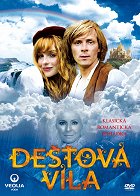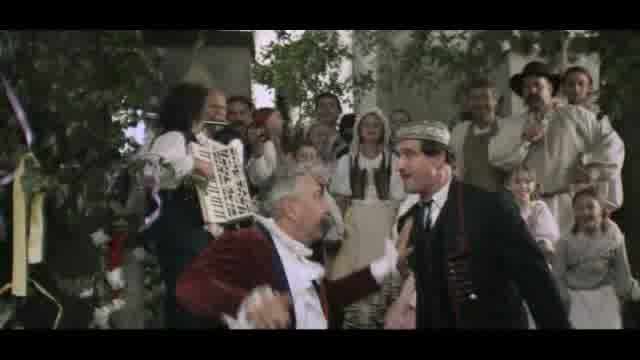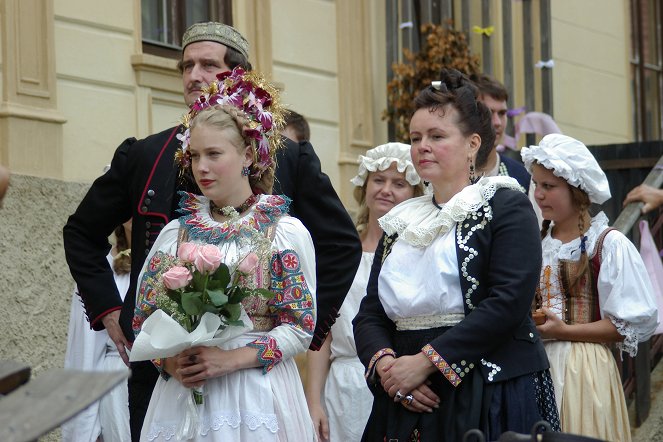Directed by:
Milan CieslarCinematography:
Karel FairaislComposer:
Petr HapkaCast:
Vica Kerekes, Jakub Gottwald, Lenka Vlasáková, Miroslav Donutil, Simona Stašová, Jaromír Dulava, Jitka Sedláčková, Aneta Krejčíková, Aleš Háma, Jana Janěková (more)Plots(1)
Elements that control the Earth – Air, Fire, Earth and Water – subject people to a “regular inspection”. We watch Water on behalf of all of the elements; people call it the Rain Nymph. She wanders through the country dressed like a poor woman. She finds that people started to think mainly of money and that love and good wither away. One of these people is farmer Lakota (Miroslav Donutil) whose son Ondra (Jakub Gottwald) is in love with poor Květuška (Viva Kerekes). The farmer is not happy to see their love. When the elements come back to the Sun, they demand severe punishment. The Sun hesitates, it knows that people are people, and likes them despite their failures but is outvoted. The Rain Nymph (Lenka Vlasáková) helps him in the last moment. She asks the Sun whether she could punish the people herself, and takes rain away from people. The country suffers from draught. People have nothing to harvest, grain does not grow and straw is almost burnt. Lakota uses the situation and promises to Ondra that he can marry Květuška under the condition that she provides for rain. She goes to the Rain Nymph and has to complete three tasks. The tasks are difficult, very difficult and Květuška and Ondra will not have won even after they are completed. Lakota is incorrigible... But do not be afraid, good and love will finally win as is usual in fairy-tales. (official distributor synopsis)
(more)Videos (2)
Reviews (4)
Cieslar has proven that he’s good and he’s already proven his reputation in such great films as Spring of Life and Shadows of the Deceased. I was quite pleasantly surprised by The Rain Fairy. This is a truly cinematic fairy tale from the Czech basin that we haven’t seen in a long time. The special effects, cinematography, and music are great. The visual concept is pleasing to the eye, as are the meticulous and distinctive costumes. The story is clearly linked by a traditional view of the Bohemian countryside and the supernatural motivated by the most basic barbaric religions. The middle and older generations act excellently and the only thing that doesn't work, unfortunately as usual, are the new young actors. Kerekes and Gottwald's performances are examples of incredibly non-film acting. It's a mystery to me why they keep trying these young "talents" from Slovakia or endless series when it doesn't have the desired results.
()
I hate when people say a genre is "dead," whether it's in music, film, or anything else. It’s just nonsense. If that were true, most genres would be "dead." Fairy tales have always been around, and they always will be, so why overthink it? As for The Rain Fairy itself, it's not a bad fairy tale at all—just a bit dull. Actors like Donutil, Dulava, Dejdar, and Nárožný were great, but something was missing to really make it engaging. The sets were beautiful, and I was genuinely surprised by how stunning Iceland looked. Even the effects were decent, and the story caught my attention. But compared to something like It is Hell with a Princess, this fairy tale just feels too serious. Fairy tales were never meant to be taken that seriously. Look at Dařbuján a Pandrhola from the 50s—nobody cared that there was drinking involved! For me, a good fairy tale needs a sense of honesty, and that's what felt a bit lacking here.
()
Expository and well-cast boredom with a few bright moments, the brightest of which was probably Petr Nárožný's small role. Otherwise, I could only shake my head in amazement, because the plot was unusually strange and the logic of who went where and why, who followed, who came back and what happened to them afterwards, left me wondering.
()
It's evident that the best years of Czech fairy tales are indeed behind us, but this fairy tale still has quite good characters and, above all, an interesting story. What doesn't quite work is the execution, which feels oddly unnatural due to the digital effects. It doesn't look nice, and I think even children might not like it in some places. But it has a nice, fairly standard division between good and evil, and a plot that must end well, although you want to know how it will reach that good ending.
()




Ads